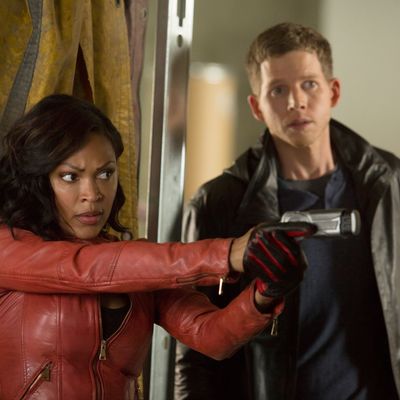
If it were possible to see the future, the makers of Minority Report might have foretold the problems inherent in making a TV series from Steven SpielbergÔÇÖs 2002 hit. That minor Spielberg classic was a gradually unfolding mystery set in 2056, about a depressed, drug-addicted cop named John Anderton (Tom Cruise) who learned that the stateÔÇÖs predictive, or ÔÇ£precognitive,ÔÇØ crime-prevention program was flawed and the existence of contrarian or ÔÇ£minorityÔÇØ reports about the certainty of crimes had been covered up. The film branched out into a conspiracy thriller, as such movies tend to do; all of the plot twists resolved themselves in something like a happy ending, with Anderton, who was scarred over the unsolved abduction of his son, achieving catharsis and closure, and the precog program being dismantled. The most important takeaway from this synopsis is that Minority Report was John AndertonÔÇÖs story first, his societyÔÇÖs second, and the precogs were supporting players and expository devices, despite Samantha MortonÔÇÖs ferocious performance as Agatha, the seer who accompanied the hero on his journey. The film, based very loosely on a Philip K. Dick short story, was about what happens to a society when police and prosecutorial certainty becomes an unofficial state religion; Anderton was a heretic or apostate, wailing the truth like the prophet Cassandra.
The Minority Report TV series, which debuts tonight, is set nine years after the film. It seems determined to build the story out into a ÔÇ£mythologyÔÇØ and turn the precogs ÔÇö who were released into society after the dismantling of the program ÔÇö into major characters, with a case-of-the-week slowly but surely building toward a big revelation or two. The pilot begins with a flashback to 2040 featuring the three precogs as children, then jumps forward to the present (2065). One of the seers, Dash (Stark Sands), has gone vigilante, wandering from city to city, trying to prevent murders before they can occur. Apparently there are a lot more of them now, with the end of the precog program. The obligatory tough cop, Meagan GoodÔÇÖs Laura Vega, is mainly here to help Dash in his quest to prevent a political assassination and reunite with his missing twin, Arthur (Nick Zano), though if the series lasts longer than a few episodes theyÔÇÖll probably give her something more to do besides sparring with her fellow officer Will Blake (Wilmer Valderrama, formerly of That ÔÇÿ70s Show), whose furtive glances and odd line readings suggest that thereÔÇÖs more to him than professional ambition and smug machismo.
Besides SandsÔÇÖs performance as Dash, a likably frazzled ingenue who hurls himself bravely into action but has no physical skills to speak of, the production design is the best (maybe only) reason to watch Minority Report. Fox must have spent a hefty chunk of change replicating and building upon the world of SpielbergÔÇÖs movie. Some of the touches (such as high-speed trains that gain and lose cars depending on their track position, and flying surveillance insects that have presumably replaced SpielbergÔÇÖs spiders) are inspired, and there are always two or three things worth looking at. Unfortunately, very few of them are characters. The only lead on the series who immediately comes across as plausibly human is Dash; Vega comes across as little more than a tough-talking, arm-twisting ÔÇ£strong woman,ÔÇØ i.e., a cipher whose demeanor and skills are (for the time being, anyway) a substitute for meaningful character development. The meager revelations about her family give us some hope but no excitement, and the political-assassination plot wraps up so quickly and decisively that you might be left wondering if what weÔÇÖve got here isnÔÇÖt a meaningful and worthy extension of a very good movie, but another damn cop show, with lots more sci-fi tech.
The flash-cut, silent-film-styled visualizations of possible future crimes, which were so bracing 13 years ago, have been absorbed into popular culture to the point where they canÔÇÖt possibly have as much impact, and the precogsÔÇÖ established track record of correctly calling the future removes a lot of suspense. If weÔÇÖre always going to be seeing whatÔÇÖs about to happen, and the only significant unresolved question is what the images mean, weÔÇÖre in for a pretty long, dull haul, I fear. ThereÔÇÖs a stray line to the effect that the precogs arenÔÇÖt always right in their predictions, but that seems a slim reed on which to hang hopes that Fox has produced a potentially great science-fiction drama, as opposed to an earnest rehash, and IÔÇÖm not entirely convinced that a lot of people are going to stick around to find out which it is.


